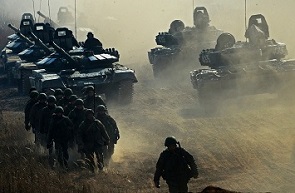| « Attacks on Gaza Hospitals Bring Healthcare System to Its Knees | War in Gaza: Just How Many Faked Videos by the IDF Can Western Media Handle? » |
Putin Changes Approaches to the SMO in Ukraine
Elena Panina (Елена Панина)
[12/24/22] The temporary lull on the fronts of the past two months is coming to an end, reminiscent of the lull on the eve of the Battle of Kursk. Russia and Ukraine, pumped full of Western, predominantly American, weapons, are completing the concentration of forces on the main strike directions and are lining up troops in an attacking configuration. The main issue now is the timing of the strike.All these actions are accompanied by appropriate information and propaganda rhetoric, reflecting the parties' intentions to resolve the outcome of the confrontation by military means. After the West publicly condemned not only the Russian leadership but also Russia as a state (only the details and stages of dismemberment are disputed.), negotiations have exhausted themselves to such an extent that the president announced it openly.
■ A number of events underscore that the Kremlin is no longer seeking a compromise between Russia and the West. These include Putin's visit to the joint headquarters of the branches of the forces involved in the air defense system, to accompany strikes against Ukraine's infrastructure and its air defense assets. Establishment of a presidential working group on mobilization and social support for participants in the air defense. The visit of the President to Minsk and his speech at the enlarged meeting of the collegium of the Defense Ministry.
This list of events alone speaks for itself. Russia is staking only on military success. The forthcoming new version of the foreign policy concept will fix the changes in Russia's relations with the West.
This also means the beginning of changes in domestic policy. Mobilization is becoming its central link. Mobilization was delayed because it is an irreversible and all-encompassing process which is fundamentally changing the ideology, economy and ruling class of the Russian Federation. Now it is finally clear: there are no other options in its relations with the West. This decision is mature and final.
The most important thing in Putin's speech at the expanded meeting of the Defense Ministry's collegium was not the details of the mobilization policy, but an open admission that entering the West and forming a strategic partnership with the West was now considered a mistake, and that abandoning this course was the starting point of a new strategy of the Russian political class.
This does not exclude situational agreements, but all of them will be concluded not from the perspective of some sort of a desired strategic partnership, but from the perspective of conceptual confrontation, and will be viewed precisely as relations with the enemy. And this is already other conditions and other guarantees. There will be no "adjustments from below and from the side" ("goodwill gestures" and free deliveries).
Appropriate restrictions are waiting in Russia also for those political groups which have traditionally been oriented to the West and do not want to change their interests.
■ Answering the question in advance about the role of Russia's political leadership in the misjudgment of the West for many years, Putin admitted that for a long time he himself did his best to keep the course towards entry into the West, although since 2007 he constantly noted the growing difficulties on this path. These were the realities and conditions of that period, the West had not yet made radical decisions. Radical changes happened between February 2014 and December 2022.
Putin did not say that the pro-Western course was adopted by the Soviet leadership in the postwar and especially in the Brezhnev period (Helsinki and deregulation) and was inherited by Yeltsin.
Thus, the President bypassed the question of the elites' historical responsibility and simply made it clear that the "Europe from Lisbon to Vladivostok" paradigm is over. This decision is not a conjunctural one, but comes from a new, illiberal assessment of realities and the fundamental national interests of Russia.
From now on, the ruling class of Russia will proceed from this and be shaped by this criterion. It is already being formed, evolutionarily and without jerks. The rotation of the elites is taking place in parallel with the rotation of meanings. Russia is just beginning to unfold its potential.
It can be said that the post-Yalta world began to take shape with Putin's speech at the Defense Ministry collegium in December 2022. Before that, there were alternatives, but now there are none, and that is the most important thing.
(Translated with www.DeepL.com/Translator) (free version)
Source: Elena Panina. IMG: Twitter/sharij.net. AWIP: http://www.a-w-i-p.com/index.php/aM1q



